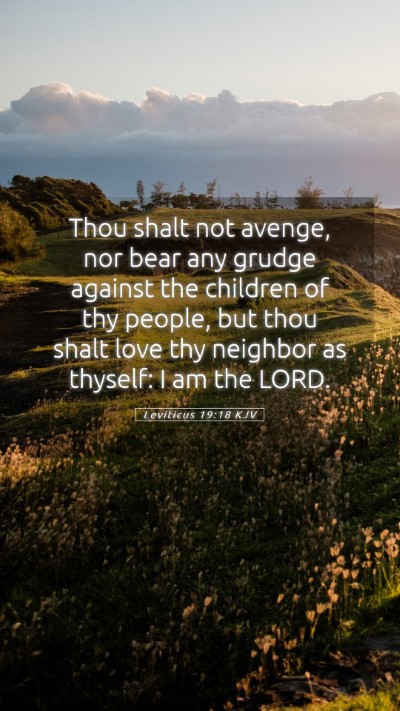Understanding Leviticus 19:18
Leviticus 19:18 states: "You shall not take vengeance, nor bear any grudge against the children of your people, but you shall love your neighbor as yourself: I am the LORD." This verse is integral to understanding the moral fabric of the Israelite community and emphasizes the importance of love and forgiveness. Below is a comprehensive analysis of this passage, drawing insights from historical context and notable public domain commentaries including those from Matthew Henry, Albert Barnes, and Adam Clarke.
Context and Significance
Leviticus is a book that primarily focuses on laws and regulations for the Israelites, given as part of their covenant with God. Chapter 19 encompasses various moral and ceremonial laws, culminating in this important instruction regarding interpersonal relationships. The significance of this verse is not just in its command to love one's neighbor, but also in its roots within God's character—indicating that through love, the essence of divine law is expressed.
Verse Breakdown
- You shall not take vengeance - The mention of vengeance suggests a prohibition against personal retaliation. According to Matthew Henry, this reflects a higher moral standard, encouraging believers to rise above petty grievances.
- Nor bear any grudge - This indicates an internal emotional state that should be guarded against. Albert Barnes emphasizes that harboring grudges is contrary to the nature of God’s forgiveness and love.
- Love your neighbor as yourself - This is a foundational principle in both Judaism and Christianity. Adam Clarke illustrates that this command elevates the standard of conduct to one of selflessness and deep compassion for others.
- I am the LORD - This closing statement serves as a reminder of God's authority, reinforcing that adherence to this command is part of worship and obedience to Him.
Applications in Daily Life
The principles found in Leviticus 19:18 can profoundly impact our daily practices and relationships. They challenge individuals to engage in conflict resolution without bitterness and promote a community built on love and mutual respect.
In the context of Bible study groups, this verse can serve as a springboard for discussing how to apply these teachings within our communities. Online Bible study sessions can further enhance understanding by providing diverse interpretations and practical applications relevant to modern life.
Cross References
- Matthew 22:39 - Jesus reiterates this commandment in the New Testament, framing it as the second greatest commandment.
- Romans 13:9 - Paul cites this same principle of loving one's neighbor as a fulfillment of the law.
- Galatians 5:14 - This verse emphasizes that all the law is fulfilled in one word: "You shall love your neighbor as yourself."
Conclusion
In summary, Leviticus 19:18 presents a profound biblical instruction that remains timeless in its application. Its emphasis on love, forgiveness, and community reflects God's desire for harmonious relationships. Understanding such verses is crucial for anyone seeking in-depth Bible verse analysis and Scripture understanding. By integrating them into daily life, one can embody the essence of Biblical teachings, thereby fulfilling one's call as a follower of Christ.
Further Exploration
For those interested in exploring Bible study resources about how to interpret Bible verses like Leviticus 19:18, consider engaging with Bible study guides and Bible study courses. These tools not only enhance comprehension but also provide structured learning paths to deepen one’s faith and biblical knowledge.


